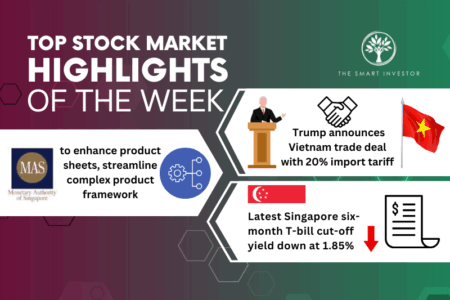The world is slowly limping out of its year-long economic slump. The IMF and the OECD have said as much. While their forecasts differ slightly, they both expect global economies to grow between 5.5 and 4.2 per cent, respectively, this year. But stock-market investors shouldn’t rush to book the lion dancers just yet. Caution is still the order of the day.
When an economy is doing well, many companies would do well, too. It stands to reason. If we see the Singapore economy firing on all cylinders, we can assume that many local companies will be making healthy profits. And we could be right.
What’s more, our jobs would be safe, and our paycheques should arrive on time. And who knows, we might even be in line for a decent bonus at the end of the year. It is only natural to also assume that households will feel more confident in an expanding economy.
Confident consumers could prompt businesses to invest more, companies could employ more staff, and might even feel more willing to raise wages, which creates a virtuous circle of investment and rising living standards.
Vaccine side effects
It is also tempting to assume that a booming economy could equate to a buoyant stock market. But stock markets don’t quite work like that. They don’t always respond in the way that we might expect them to. If anything, the exact opposite could happen, which can be a source of great disappointment for unsuspecting investors.
To this point, something similar could happen as vaccines against Covid-19 are aggressively rolled out around the globe. World leaders are clearly delighted with the likelihood that millions of their citizens will be inoculated. While it is still early days yet for the prevention programme, we should eventually be able to put this awful pandemic behind us.
But the $64,000 question is whether the eradication of the deadly pathogen would be good or bad for the stock market? Intuitively, we might conclude that it would be fantastic for shares. After all, the world will gradually be able to recover its lost economic output.
Alphabet soup
People will be able to go back to work. Companies will be able to pick themselves up and hopefully resume service as normal. That is what is meant by an economic recovery. For some economies it could be a ‘V’ shaped recovery. For others it could be ‘U’, ‘W’, ‘L’, ‘Swoosh’, ‘square root’ or perhaps, ‘K’ shaped, which now appears the most likely.
But would that necessarily translate to more gains for the stock market? I am not sure about that. Thing is, the share price, or price per individual share, can be broken down into the product of two separate components: the price-to-earnings ratio and the earnings per share.
The latter is a statement of fact. It is a measure of the total amount of profit that a company makes in relation to the number of shares that it has issued. Subject, of course, to the normal caveats of financial jiggery-pokery, otherwise known as buying back a company’s own shares. It effectively reduces the number of shares in circulation, and artificially boosts the earnings per share, even if the bottom-line earnings haven’t improved.
To infinity and beyond
Then we have the other part of the equation: the price-to-earnings ratio. Unlike the earnings per share, it is largely an expression of sentiment. If the market feels confident about a company’s future earnings, then it could be assigned a higher valuation.
But the valuation, or price-to-earnings ratio, is also reflective of interest rates. It is often compared to a risk-free investment such as the US 10-year Treasury. When prevailing interest rates are low, the P/E ratio can afford to be significantly higher. If interest rates are zero, then the P/E ratio could theoretically go to infinity, and still be deemed cheap.
A walk in the park
This poses an interesting dilemma. As vaccines start to work their way through the global population, economic conditions could start to improve. By inference, central banks could feel less inclined to keep interest rates low, which could cause those lofty P/E ratios to start unravelling.
The question for investors is whether the pick-up in earnings per share will be enough to counteract the compression in the price-to-earnings ratio. For some companies, it could be a walk in the park. For others, it could be a walk of shame.
It is undeniable that the last few years have been favourable for shares. But pushing up share prices is akin to pushing a car up a hill. It is easy when shares are not weighed down by the gravity of interest rates. It is a different matter when central banks provide a drag by withdrawing their monetary support, which they must do eventually.
It is therefore important that we pick our shares carefully. Warren Buffett said: “A man who tries to carry a cat home by its tail will learn a lesson that can be learned in no other way.” Never have truer words been said, as markets scale and breach all-time highs.
Note: An earlier version of this article appeared in The Business Times.
Want to stay abreast of the latest investing news, analyses, and stories for FREE? Subscribe to our weekly email, Smart Reads, now to receive a curated list of our top articles weekly. CLICK HERE to subscribe now!
Follow us on Facebook and Telegram for the latest investing news and analyses!
Disclaimer: David Kuo does not own shares in any of the companies mentioned.




